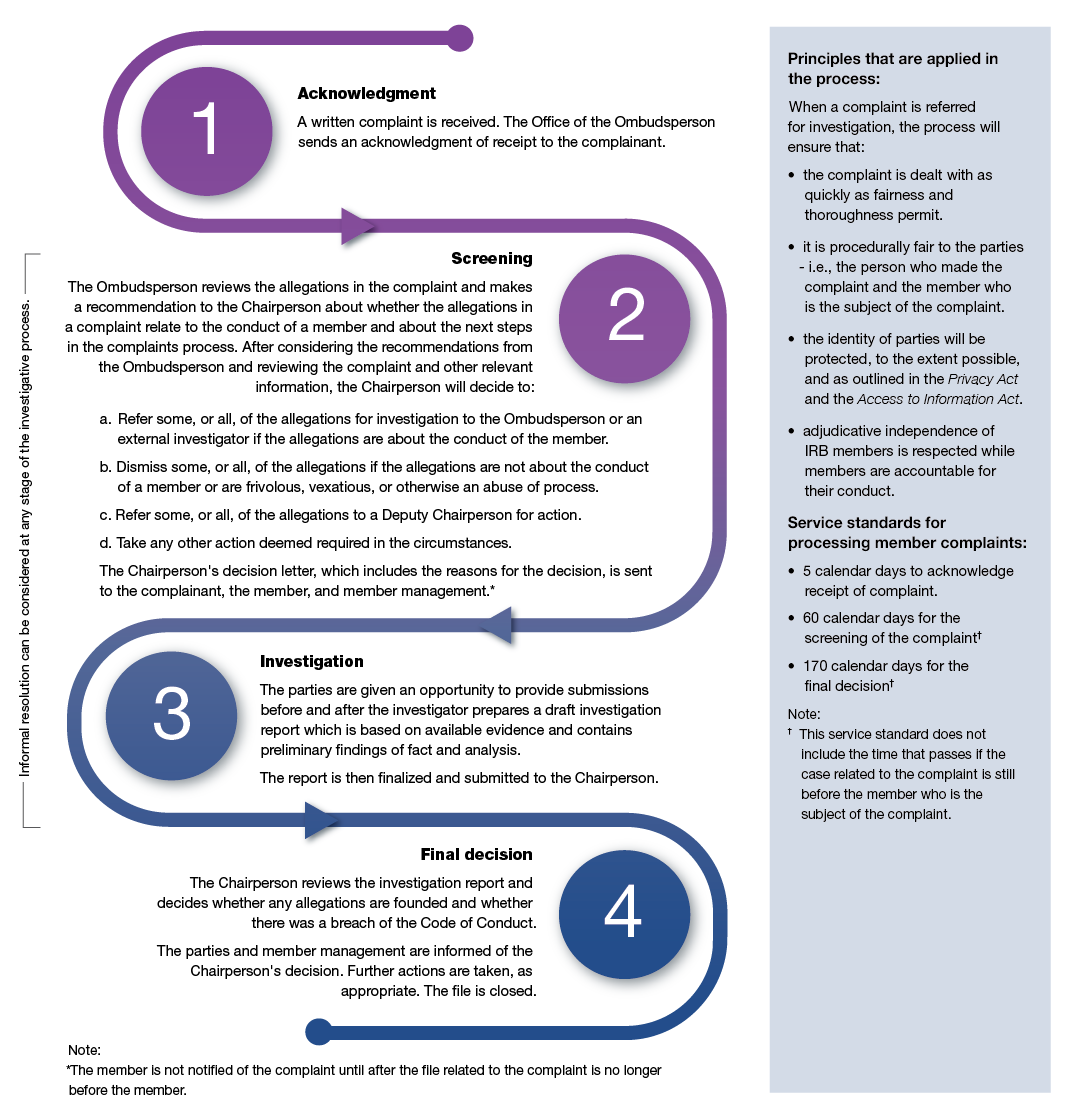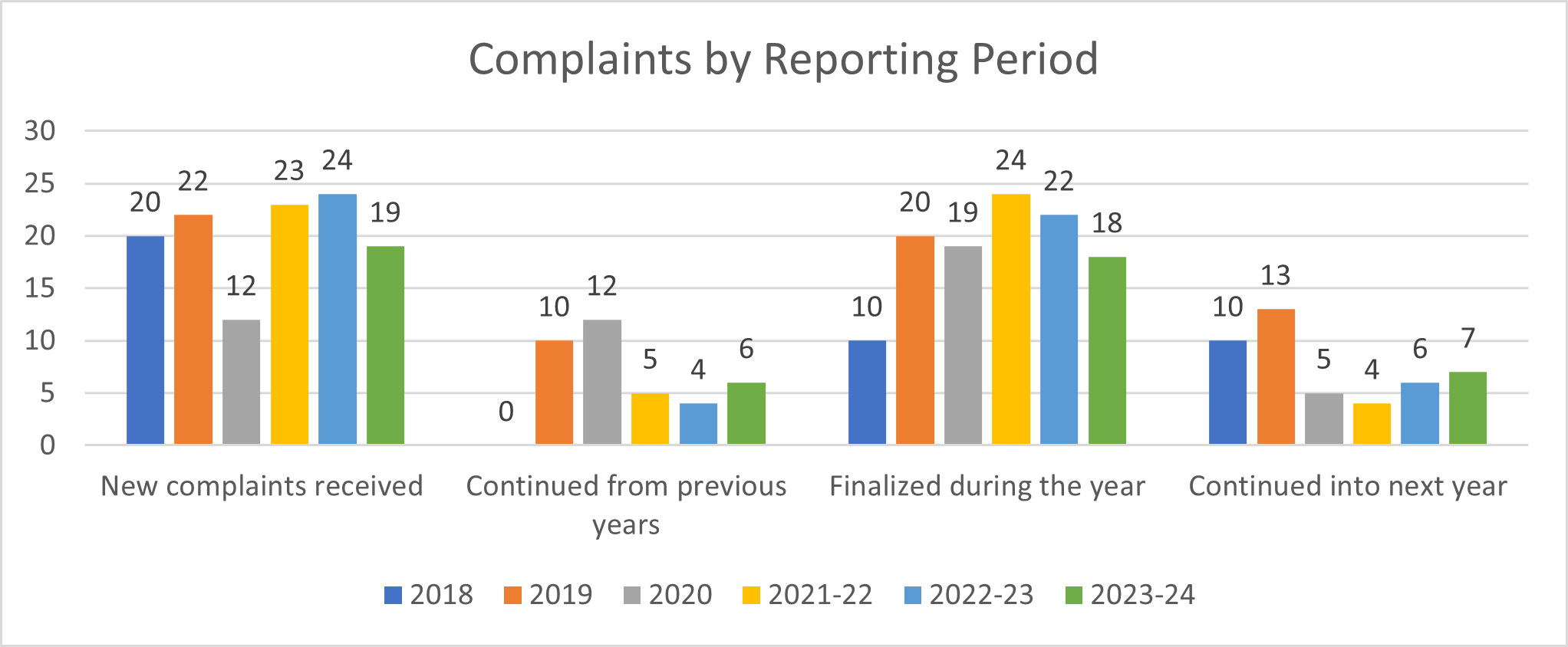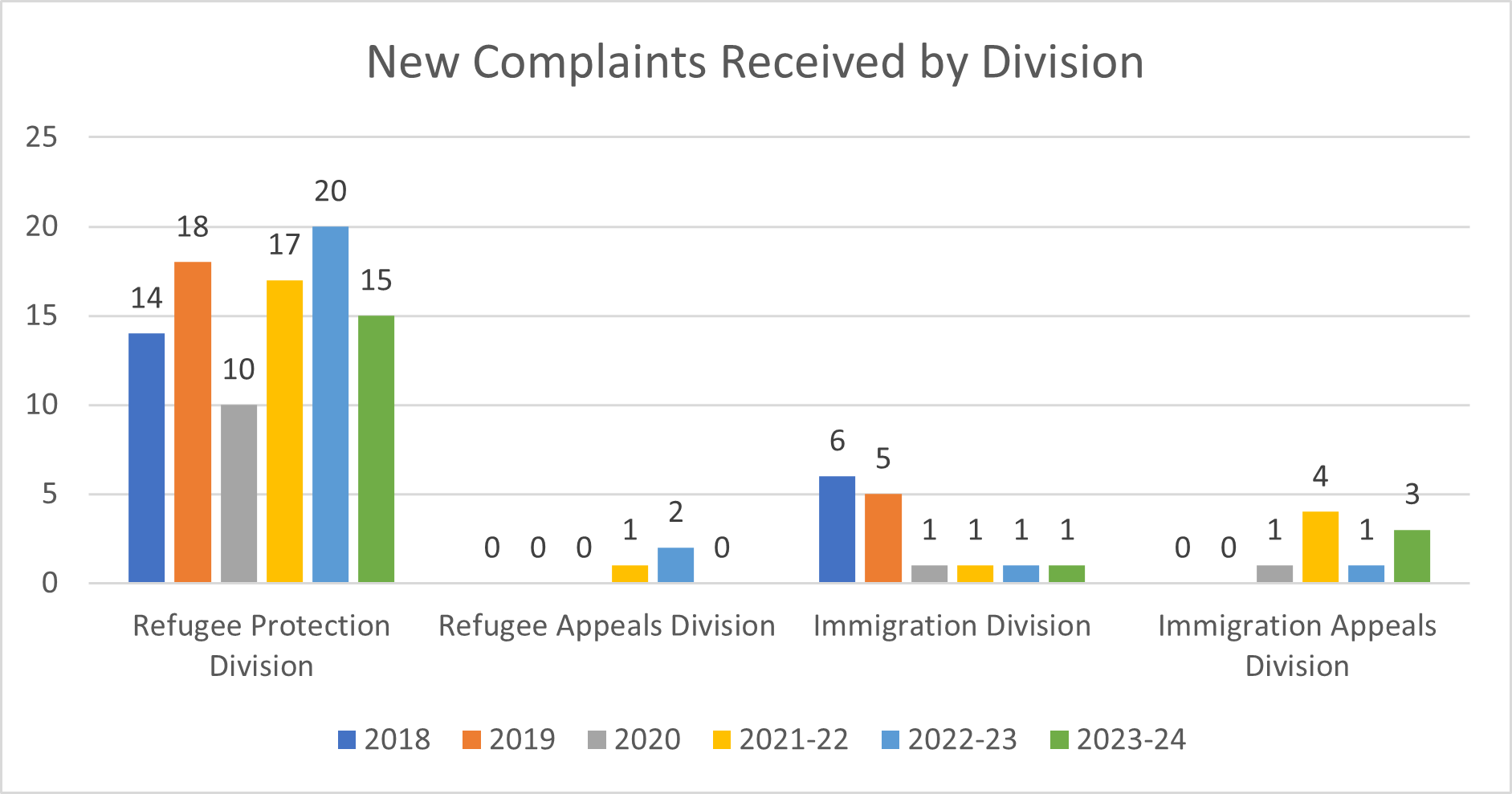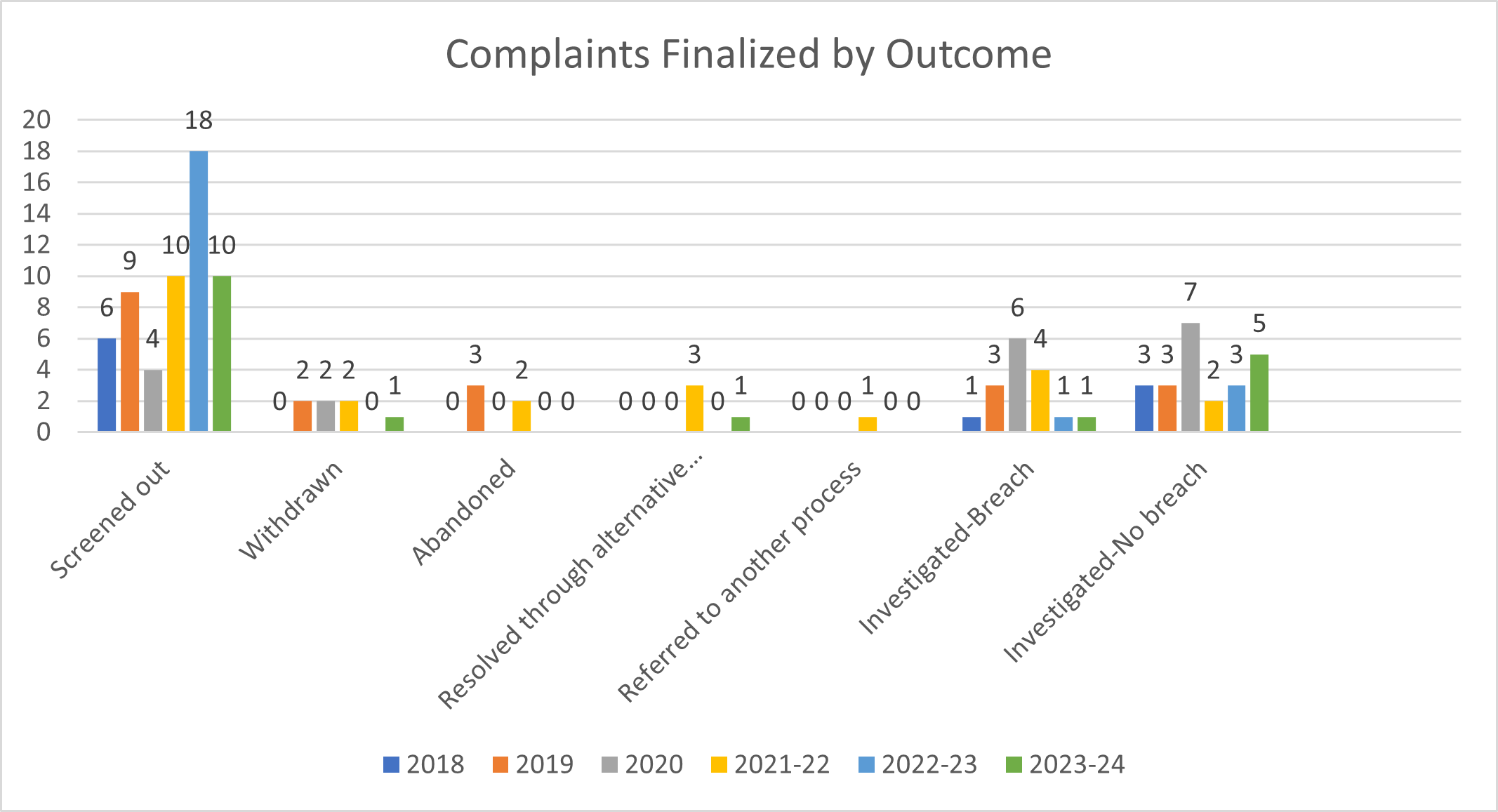Publication information
© His Majesty the King in Right of Canada, as represented by the Minister of Immigration, Refugees and Citizenship, 2024.
Cat. No. MQ1-16E-PDF (Electronic
PDF, English)
ISSN: 2816-7929
On this page
Dear Madame Chairperson,
This is the sixth annual report on the member complaints process under the Immigration and Refugee Board of Canada's (IRB) Procedures for Making a Complaint About a Member (Procedures), covering the period from April 1, 2023 to March 31, 2024.
During this period, the
IRB's Office of the Ombudsperson had jurisdiction to receive and investigate complaints with respect
IRB decision-makers (members) across the four Divisions of the Board: the Refugee Protection Division, the Refugee Appeal Division, the Immigration Division, and the Immigration Appeal Division. Together, 678 decision-makers (members) made over 79,000 decisions and held over 43,000 hearings. There were six (6) complaints carried forward from the previous year, and 19 new complaints were received by my office.
This report contains information about the complaints received and/or finalized in fiscal year 2023-24, along with observations, trends, and outcomes of complaints.
Annex A contains case summaries of each complaint finalized in 2023-24.
In 2024-25, my office will continue to strengthen the member complaints process, as we strive for continuous improvement in how to resolve complaints in the most efficient manner possible, while maintaining public and member confidence in our work.
Stephanie Shatilla
Ombudsperson
Introduction
The 678 members of the
IRB held over 43,000 hearings and made over 79,000 decisions during this reporting period. During the same period, the Office of the Ombudsperson received 19 complaints, which is about one complaint per 4,198 decisions or one complaint for approximately 2,256 hearings. This indicates that
IRB members generally and regularly conduct themselves appropriately and in accordance with the high professional standards expected of them. At the same time, uptake can be an effective indicator for continuous improvement, awareness, and building trust in the complaints process. A complaints process that is clear, fair, efficient, and transparent is one that stakeholders have confidence in.
The average time to process complaints increased this reporting period. The service standard related to acknowledging complaints was met 100% of the time in 2023-24, while screening was met 58% of the time. Due to a variety of circumstances, the service standard for final decisions was not met on 6 files this year.
In keeping with past reporting periods, the majority of complaints were about courtesy, respect and professionalism. Similarly, most complaints (80%) were about members of the largest
IRB tribunal, the Refugee Protection Division.
Submitting or receiving a complaint received do not automatically mean a breach of the
Code of Conduct for Members of the Immigration and Refugee Board of Canada (the Code). Of the 18 complaints finalized in 2023-24:
- 5 were investigated and did not lead to a breach of the Code
- 1 was investigated and led to a breach of the Code
- 1 was abandoned
- 1 was resolved through Alternative Dispute Resolution
- 10 complaints were considered out of scope of the Procedures
The complaints that were not about the conduct of members were based on adjudicative matters and/or the members' decisions.
Complaints process
The Procedures outline the process for making a complaint about a member whose conduct is believed to be contrary to the Code. The Ombudsperson, who has jurisdiction over the complaints process, reports directly to the Chairperson and is independent of the four tribunals (Divisions) whose members are the subject of complaints.
Any individual may make a complaint about the conduct of a member of the
IRB. The complaint must be in writing and sent to the general email inbox for the Office of the Ombudsperson (irb.irb-ombuds-conduct-conduite.cisr@irb-cisr.gc.ca) or sent by mail. Complainants are encouraged to use the
complaint form to assist with this process, although it is not required.
Central to the process is the principle that it does not interfere with a member's independence. This means that complaints cannot be about what a member decides in a case. When the concern is about a member's decision (such as their reasons for decision or concerns about a denial of procedural fairness or natural justice), the appropriate action for would-be complainants is to file an appeal with the Refugee Appeal Division or the Immigration Appeal Division, or to seek leave and judicial review with the Federal Court, as appropriate.
Member complaints process

Text format - Member Complaints Process
Acknowledgment
A written complaint is received. The Office of the Ombudsperson sends an acknowledgment of receipt to the complainant.
Screening
The Ombudsperson reviews the allegations in the complaint and makes a recommendation to the Chairperson about whether the allegations in a complaint relate to the conduct of a member and about the next steps in the complaints process. After considering the recommendations from the Ombudsperson and reviewing the complaint and other relevant information, the Chairperson will decide to:
- Refer some, or all, of the allegations for investigation to the Ombudsperson or an external investigator if the allegations are about the conduct of the member
- Dismiss some, or all, of the allegations if the allegations are not about the conduct of a member or are frivolous, vexatious, or otherwise an abuse of process
- Refer some, or all, of the allegations to a Deputy Chairperson for action
- Take any other action deemed required in the circumstances
The Chairperson's decision letter, which includes the reasons for the decision, is sent to the complainant, the member, and member management.*
* The member is not notified of the complaint until after the file related to the complaint is no longer before the member.
Investigation
The parties are given an opportunity to provide submissions before and after the investigator prepares a draft investigation report which is based on available evidence and contains preliminary findings of fact and analysis.
The report is then finalized and submitted to the Chairperson.
Final decision
The Chairperson reviews the investigation report and decides whether any allegations are founded and whether there was a breach of the Code of Conduct.
The parties and member management are informed of the Chairperson's decision. Further actions are taken, as appropriate. The file is closed.
Principles that are applied in the process:
When a complaint is referred for investigation, the process will ensure that:
- the complaint is dealt with as quickly as fairness and thoroughness permit
- it is procedurally fair to the parties - i.e., the personwho made the complaint and the member who is the subject of the complaint
- the identity of parties will be protected, to the extent possible, and as outlined in the
Privacy Act and the
Access to Information Act
- adjudicative independence of
IRB members is respected while members are accountable for their conduct
Service standards for processing member complaints:
- 5 calendar days to acknowledge receipt of complaint
- 60 calendar days for the screening of the complaint†
- 170 calendar days for the final decision†
†This service standard does not include the time that passes if the case related to the complaint is still before the member who is the subject of the complaint.
Findings, observations, and trends
The number of complaints received over the past few years has remained fairly stable.
During the 2023-24 reporting period, 19 new complaints were received, and 6 complaints were carried over from 2022-23. Of these 25 complaints, 18 were finalized before March 31, 2024. See Figure 1 below.
7 of the 19 complaints received were not finalized in the current reporting period: 4 complaints were in the screening phase and 3 complaints were in the investigation phase at the end of March 2024.
Most complaints were received from counsel, followed by self-represented individuals. In 2023-24, about 55% of complaints received were from counsel and 35% from self-represented individuals. The remaining ten percent were submitted by a designated representative or Minister's Counsel.
Figure 1: Summary of complaints by reporting period

Text format - Figure 1: Summary of complaints by reporting period
Complaints received by year
| Year | 2018 | 2019 | 2020 | 2021-22 | 2022-23 | 2023-24 |
|---|
| Continued from previous years | 0 | 10 | 12* | 5 | 4 | 6 |
| New complaints received | 20 | 22 | 12 | 23 | 24 | 19 |
| Finalized during the year | 10 | 20 | 19 | 24 | 22 | 18 |
| Continued into next year | 10 | 13 | 5 | 4 | 6 | 7 |
*In the
Second Annual Report on Complaints, one complaint was mistakenly reported as having been received in 2019; however, the complaint was officially received in 2020.
Complaints being continued into the next reporting year remains consistent.
As depicted in Figure 1, since 2020, the number of complaints being
continued into the next year remains consistent. This trend is an indication of the efforts taken to process complaints in a timely manner. The complaints process focuses on initiating the processing of complaints immediately following receipt. The complaints which continue to the next year are actively being managed; either they are on hold until the member is no longer seized of the file and being monitored for finalization (as the member is still seized with the file), or the complaint is in the screening or investigation phase. The number of complaints continued into next year is difficult to predict or manage since it depends on when the complaint was received, what stage the complaint is in, and the length of time it takes to complete an investigation.
The average number of days to finalize a complaint has increased.
In 2023-24, the time to acknowledge a complaint decreased, while the time to screen and finalize complaints increased to:
- acknowledged within an average of 1 calendar day
- screened within an average of 83 calendar days
- finalized within an average of 220 calendar days
Acknowledgment of a complaint involves explaining the member complaints process and telling complainants what to expect next. The positive trend in acknowledgment can be attributed to the increased efficiency in how new complaints flow through this step in the process.
The expectation is that service standards are met under normal, day-to-day operations. The ability to meet these timelines may be impacted by the quality and completeness of the information that is received, as well as other factors.
For this reporting period, complaints were (see
Table 1 below):
-
acknowledged within the established service standard
100% of the time
-
screened within the service standard
58% of the time
-
final decision letters sent within the service standard
0% of the time
The acknowledgment service standard was met in 2023-24. The service standards with respect to the screening and final decision, however, were not met. There were more investigations completed in this year than in the two previous years combined. The complaints that were investigated were complex in nature and this, combined with other factors, contributed to longer screening and investigation timelines.
Table 1: Service standards results for 2023-24
| Type | Description | Standard | Target % | Result % |
|---|
|
Acknowledgment | Acknowledgment letter sent to complainant following receipt of the complaint | 5 calendar days from receipt of complaint | 100 | 100 |
|
Screening | Screening decision letters sent to parties following screening | 60 calendar days* from receipt of complaint | 80 | 58 (8/14) |
|
Final Decision | Final decision letters sent to parties following investigation | 170 calendar days* from receipt of complaint | 80 | 0 (0/5) |
*This does not include the time that passes while a complaint is temporarily placed on-hold and not actively processed such as when the case related to the complaint is still before the member who is the subject of the complaint.
The number of complaints received on a per member and per hearing basis remains very low.
In 2023-24, 19 new complaints were received out of decisions made by 678 members; or one complaint received for every 36 members, which remains consistent over the years. While the number of complaints has been relatively stable since 2018, the number of decisions made, and hearings held, has increased steadily since annual reports began in 2018. As outlined in
Table 2 below, there was one complaint submitted for every 4,198 decisions made and one complaint for every 2,256 hearings held. This highlights that the
IRB receives relatively few complaints despite the tens of thousands of decisions made and hearings held by its members.
A number of considerations follow from this data. The majority of members conduct themselves appropriately in undertaking their responsibilities as members. The low number of complaints received may also reflect awareness of the complaints process. Continuous improvement of the complaints process may contribute to increased awareness and to reinforced confidence in the transparency and objectivity of the process. The latter consideration is often raised in relation to recourse mechanisms such as investigations. It takes time to build confidence and trust in a process. As referenced in the 2021
Evaluation of the
IRB process for making a complaint about a member, individuals want to feel there is value in going through the process and have confidence that they will be treated fairly.
Table 2: Members who made decisions, total decisions made by members, total hearings held by members
| Year | Members who made decisions | Total decisions made by members | One complaint received per number of decisions | Total hearings held by members | One complaint received per number of hearings |
|---|
2023-24
| 678 | 79,762 | 4,198 | 42,872 | 2,256 |
| 2022-23 | 608 | 72,552 | 3,023 | 41,084 | 1,711 |
| 2021-22* | 691 | 87,325 | 3,797 | 49,543 | 2,154 |
| 2020 | 542 | 44, 482 | 3,737 | 20,928 | 1,744 |
| 2019 | 400 | 72, 500 | 3,295 | 38,601 | 1,930 |
| 2018 | 368 | 47, 914 | 2,396 | 32,829 | 1,641 |
*15-month reporting period from January 1, 2021 to March 31, 2022
Most complaints received were about the conduct of an
RPD member.
The
RPD is the largest tribunal at the
IRB; it was responsible for approximately 69 per cent of decisions during the reporting period and 72% of hearings. As a result, the division continues to receive the most complaints, with 80% of all complaints received.
Given the relatively low number of complaints received, it is difficult to draw any meaningful trends from this information. It is important to note, however, that a submission of a complaint does not automatically lead to an investigation or indicate a breach of the Code of Conduct.
Figure 2 – New complaints received by Division

Text format – Figure 2: Complaints by division 2018 to 2023-24
Complaints by division 2018 to 2023-24
| Year | Refugee Protection Division | Refugee Appeal Division | Immigration Division | Immigration Appeal Division |
|---|
| 2018 | 14 | 0 | 6 | 0 |
| 2019 | 1 | | | |
| 2020 | 10 | 0 | 1 | 1 |
| 2021-22 | 17 | 1 | 1 | 4 |
| 2022-23 | 20 | 2 | 1 | 1 |
| 2023-24 | 15 | 0 | 1 | 3 |
More complaints were screened in this year than in previous years.
18 complaints were finalized during the reporting period, which includes 6 complaints carried forward from 2022-23. During this reporting year, finalized complaints were either investigated, screened out, resolved through alternative dispute resolution, or withdrawn. Figure 3 shows complaints finalized by outcome.
During the reporting period, 10 complaints were screened out as they were not within scope of the Procedures.
This reporting period saw a lower percentage of complaints screened out (55%) than in 2022-23 (82%). Approximately 50% of the 18 complaints included allegations that were unclear or vague. In these instances, the complainant was contacted for more information regarding the nature of the complaint, and, where warranted, the audio recordings of the relevant hearings were reviewed to determine if the allegations in the complaint were within the scope of the Procedures. If screened out, these complaints were dismissed as they were outside the scope of the Procedures, meaning that the Chairperson did not refer them for investigation.
The higher percentage of screened in complaints in this reporting period (55%) is consistent with the number of complaints being screened for reporting periods prior to 2022-23. The Office of the Ombudsperson will continue to reinforce the process' objectives, namely the exclusive focus on member conduct, specifically, as it relates to the standards of conduct found in sections 9 to 15 of the Code of Conduct. The Office of the Ombudsperson will also continue to look for ways to clarify the information available on the website to reinforce the objective of the process to potential complainants.
Figure 3 - Complaints finalized by outcome

Text format — Figure 3: Complaints by outcome
Complaints by outcome 2018 to 2023-24
| Year | S/O | Withdrawn | Abandoned | Resolved through alternative dispute resolution | Referred to another process | Investigated-breach | Investigated-No breach |
|---|
| 2018 | 6 | 0 | 0 | 0 | 0 | 1 | 3 |
| 2019 | 9 | 2 | 3 | 0 | 0 | 3 | 3 |
| 2020 | 4 | 2 | 0 | 0 | 0 | 6 | 7 |
| 2021-22* | 10 | 2 | 2 | 3 | 1 | 4 | 2 |
| 2022-23 | 18 | 0 | 0 | 0 | 0 | 1 | 3 |
| 2023-24 | 10 | 1 | 0 | 1 | 0 | 1 | 5 |
Outcomes: Complaints investigated and finalized
During the reporting period:
- 6 complaints were investigated by the Office of the Ombudsperson. 5 of the investigations resulted in unfounded breaches of the Code, while 1 resulted in a breach.
- In terms of the type of allegations investigated, three complaints were regarding members lacking courtesy and respect, being rude, or being unprofessional. Two complaints alleged members lacking integrity and being biased. One complaint alleged the member belittling counsel, attacking counsel's competence, and mocking them.
Individual summaries of all complaints finalized in 2023-24 are in
Annex A.
Observations, findings and trends
The number of complaints received remains consistent at about 20 per year. More complaints were screened in this year than in 2023-24. This can be attributed, at least in part, to the Office's efforts to contact complainants if allegations in their complaint were unclear or vague. As a result of more complaints being screened in, there were also more complaints investigated this year than in 2022-23. The relatively low number of complaints received per member, decision made, and hearing held indicates that most
IRB members conduct themselves with courtesy, respect, and professionalism.
In line with previous years, almost all investigated complaints referred to section 9 of the Code, which pertains to members conducting hearings in a courteous and respectful manner. Most of these complaints also referenced section 10 of the Code, which relates to members exercising their duties without discrimination, accommodating participants in proceedings, and respecting cultural differences and human rights.
For the second consecutive year, the Office did not receive any complaints related to gender-based claims, after receiving 6 complaints in each of the four previous years. The reduction of complaints based on gender-based claims can be seen as an indicator of a positive impact of the focused efforts undertaken by the
IRB to address these files. Specific efforts have included establishing the
Gender Related Task Force, ongoing mandatory training on gender violence, and updated training, tools and guidance for members, and renewed Chairperson's
Guideline 9 - Proceedings Before the
IRB Involving Sexual Orientation, Gender Identity and Expression, and Sex Characteristics.
Conclusion and looking forward
This is the sixth annual report about member complaints at the
IRB.
The member complaints process continues to be refined through updates to the Procedures and the Code of Conduct to further strengthen the accountability and transparency of the process. Complaints received 19 and finalized 18 this reporting year are in keeping with previous years. While there are tens of thousands of decisions made and hearings held by hundreds of
IRB members every year, the number of complaints received remains relatively low. Many complaints are screened out of the process as they are not related to the member conduct but rather about adjudicative matters or the member's decision. In total, 6 complaints led to an investigation with one complaint leading to a partial breach of the Code of Conduct.
Key observations from this report include the continuing need to facilitate awareness of the complaints process, reinforce a better understanding of the scope of the process, and the need to provide clear information in plain language on our website.
Efforts to strengthen the complaints process have yielded positive results. Not meeting 2 service standards shows that improvement can be more efficient in the screening and investigation steps of the process. This is something that will be examined when the Office studies the complaints process with an eye on continuous improvement.
Notably, there has been a decrease in complaints associated with gender-related claims over the past 2 years, which points to a positive outcome of the focus on this important issue. Establishing the Gender-Related Task Force, mandatory training as well as updated guidance, training and tools have most likely contributed to a decrease in complaints related to these cases.
Going forward, the
IRB will continue to build on the results of this report. Additional measures to strengthen the accountability, transparency and effectiveness of its complaints process will be undertaken, including focused outreach with stakeholder groups to promote the Procedures, their scope and their application. The
IRB will continue its efforts to provide support and training to members, which is critical for them to fulfill their responsibilities and conduct themselves in accordance with the high standards expected of them in keeping with the Code of Conduct.
In the coming year, the
IRB will review its Code of Conduct for members with an effort to make it succinct, efficient, effective, and reflective of members' obligations and work expectations. The review will aim to remove redundancies within the Code and reframe it in plain language. Other lessons learned from the last few years will be applied. The review will also require changes to the Procedures for Making a Complaint about a Member. The goal is to complete the review in 2024-25.
Annex A – Case summaries